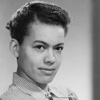Biography and Quotes for Pauli Murray app for iPhone and iPad
Developer: WindyApp Studio
First release : 12 Oct 2016
App size: 80.31 Mb
Want to learn All about Pauli Murray biography, his famous quotes and speeches, and to watch his documentary all in one App? This is for you.
Features:
- Visualized history and biography, for easy learning and reference
- Famous Quotes to get inspiration
- Documentary or speeches to bring you virtually back to the history
- Having everything about Pauli Murray in one App.
Brief Introduction of Pauli Murray:
Anna Pauline "Pauli" Murray (November 20, 1910 – July 1, 1985) was an American civil rights activist, womens rights activist, lawyer, and author. Drawn to the ministry, in 1977 Murray became the first black woman to be ordained as an Episcopal priest and among the first group of women to become priests in this church.
Born in Baltimore, Maryland, Murray was raised mostly by her maternal grandparents in Durham, North Carolina. At the age of sixteen, she moved to New York to attend Hunter College, graduating with a Bachelor of Arts degree in English in 1933. In 1940, Murray sat in the whites-only section of a Virginia bus with a friend, and they were arrested for violating state segregation laws. This incident, and her subsequent involvement with the socialist Workers Defense League, led to a career goal as a civil rights lawyer. She enrolled in the law school of Howard University, where she also became aware of sexism. She called it "Jane Crow", alluding to the Jim Crow racial segregation laws. Murray graduated first in their class, but was denied the chance to do post-graduate work at Harvard University because of her gender. She earned a masters in law at University of California, Berkeley, and in 1965 she became the first African American to receive a Doctor of Juridical Science degree from Yale Law School.
As a lawyer, Murray argued for civil rights and womens rights. National Association for the Advancement of Colored People (NAACP) Chief Counsel Thurgood Marshall called Murrays 1950 book States Laws on Race and Color the "bible" of the civil rights movement. Murray served on the 1961 Presidential Commission on the Status of Women and in 1966 was a co-founder of the National Organization for Women. Ruth Bader Ginsburg later named Murray a coauthor on a brief for Reed v. Reed in recognition of her pioneering work on gender discrimination. Murray held faculty or administrative positions at the Ghana School of Law, Benedict College, and Brandeis University.
In 1973, Murray left academia for the Episcopal Church, becoming an ordained priest in 1977, among the first generation of women priests. Murray struggled in her adult life with issues related to her sexual and gender identity, describing herself as having an "inverted sex instinct". She had a brief, annulled marriage to a man and several deep relationships with women. In her younger years, she occasionally passed as a teenage boy. In addition to her legal and advocacy work, Murray published two well-reviewed autobiographies and a volume of poetry.




